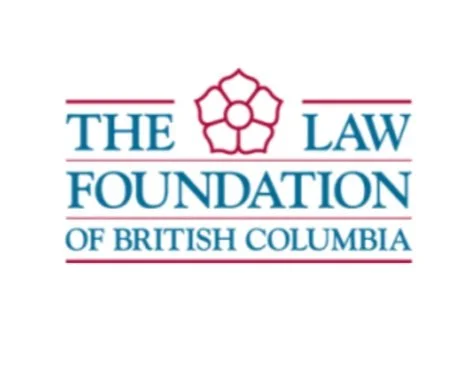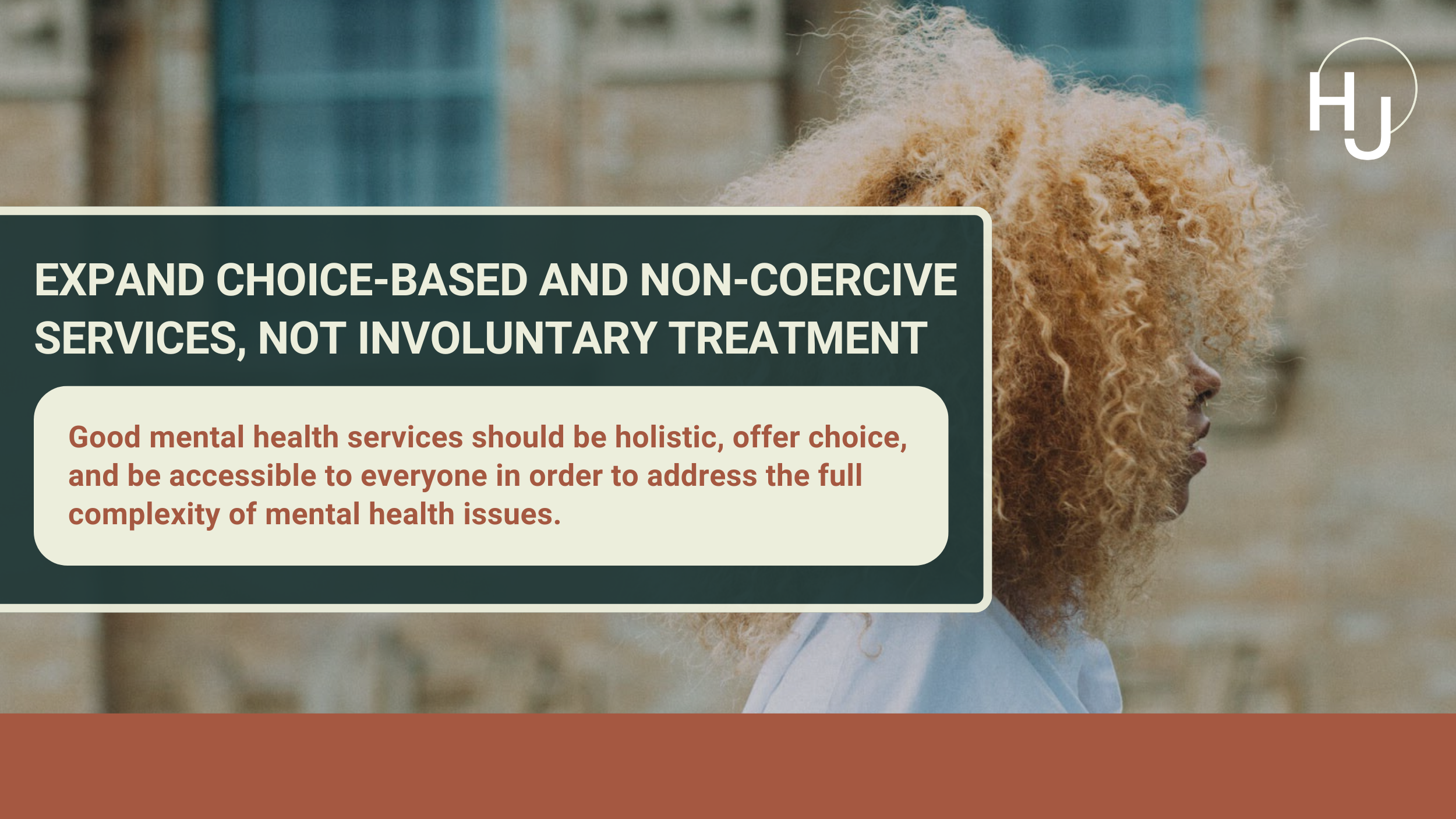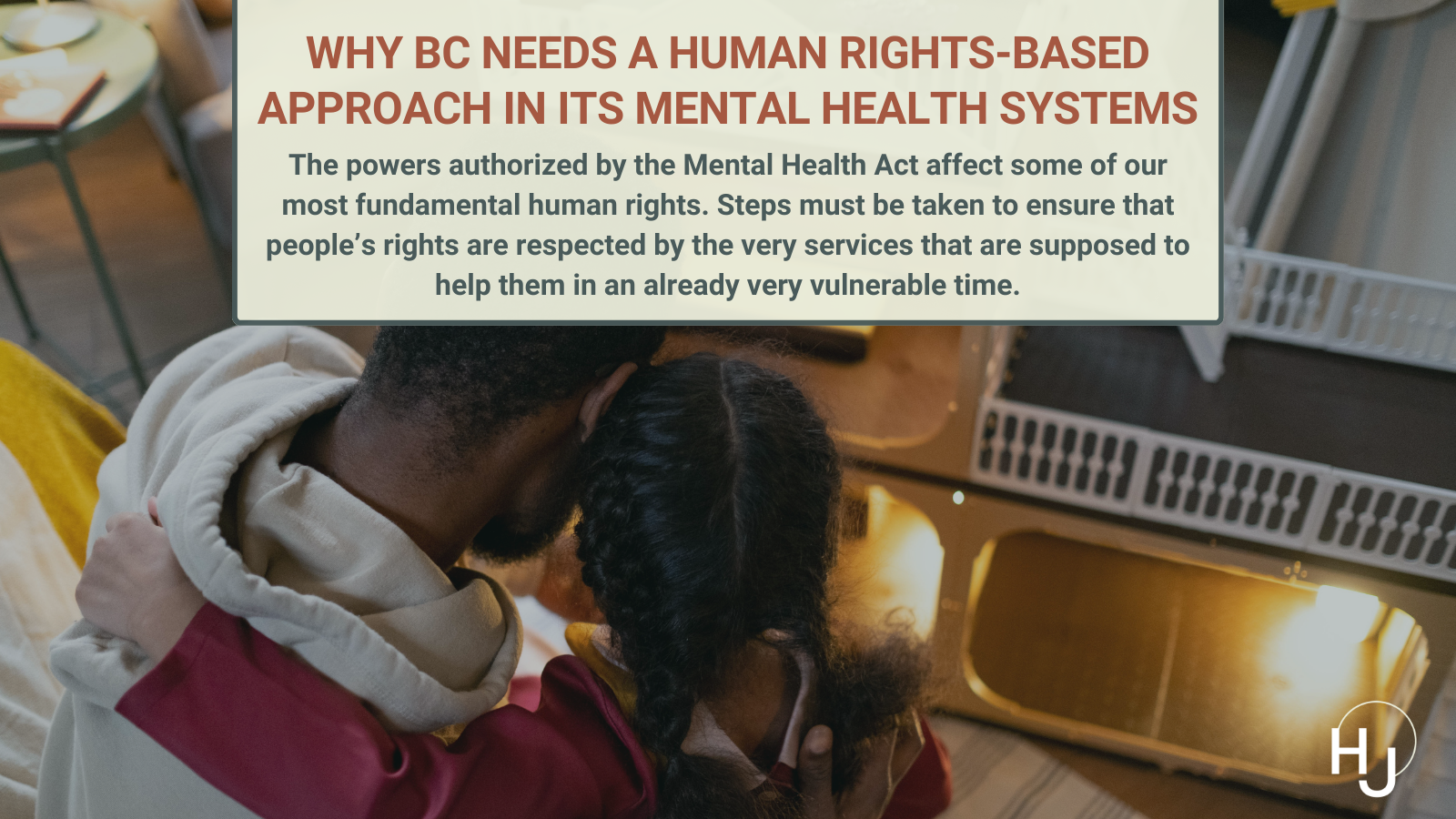
Guiding Principles
“A Path Forward: Human rights-based guiding principles for BC’s mental health law and services”
Below are some important summaries from the full publication. We encourage you to read the full publication for more information.
Acknowledgment and introduction
-
Acknowledgement of territories
Health Justice’s work focuses on provincial laws that apply throughout the land that is colonially named British Columbia. These colonial laws impact Indigenous people living on traditional, ancestral, and unceded First Nation territories as well as land that is governed by treaties. Currently in BC, over 200 distinct First Nations, 39 chartered Métis communities, and many First Nations, Métis, and Inuit people living away from home in communities across the province hold their own unique ancestral legal orders, justice systems, well-established health practices, concepts of health, and traditional healers.
Acknowledgement of Indigenous legal orders and the impacts of colonization
Colonization, including land theft and the application of colonial laws, have disrupted these sovereign legal and health systems in numerous ways. The ongoing intentional displacement of communities from their traditional territories and the separation of children from their families and communities undermine protective factors and interrupt ways of sharing knowledge, kinship structures, communities, cultural land-based practices, and languages.
These colonial dynamics continue today in many public systems, including the health and legal systems. Involuntary mental health and substance use treatment, enforced by the colonial health and legal systems, can be experienced as yet another source of control over Indigenous people that pathologizes and criminalizes the impacts of colonialism. Recognizing this systemic context is foundational to understanding the impacts of genocide, colonization, and racism in colonial health and legal systems on First Nations, Métis, and Inuit people, as well as their resilience and resistance to those systems.
Acknowledgement of foundational expertise
All of the thoughts, ideas, and analysis in this work are built upon expertise and analysis that has been shared with us by experts with direct lived and living experience and Indigenous leaders. It has helped us understand how the system is or isn’t working, recognize how people are impacted, and identify avenues for positive change. This work would not exist without that expertise.
The work also builds on a long history of advocacy and organizing related to mental health and substance use detention, diagnosis, labels, and services, often carried out by people with lived or living experience. We want to acknowledge that Health Justice did not start this work and we have had the privilege of learning from and building upon hard work already done by others who are often unacknowledged.
It is impossible to adequately make the depth of this leadership visible with citations and individual acknowledgements. Communities and individuals sharing their wisdom and insight have deeply shaped the ideas throughout this and all of Health Justice’s work.
-
To develop this publication, we have been listening and learning from the Lived Experience Experts Group (LEEG) since May 2020 and the Indigenous Leadership Group (ILG) since November 2020. We have also heard from clinicians, family members/personal supporters, and other organizations and service providers. In spring 2022, Health Justice hosted Journey Mapping sessions where people with lived and living experience of detention and involuntary treatment under BC’s Mental Health Act shared their experiences in one-on-one interviews. Participants were diverse in terms of their geographic location in BC, community size, Indigeneity, race, gender, age, family status, and many other factors. All of this expertise has informed this publication, and we have sought feedback in an iterative way as the document was developed. We also held focus groups and other engagements with people with lived and living experience to develop the principles in this work.
Throughout the work, you will see quotes and analysis from Lived Experience Experts, which were provided through Lived Experience Expert Group meetings, focus groups, or through Journey Mapping interviews. Quotes and analysis from the Indigenous Leadership Group are also featured, which were provided during the Group’s meeting process. Authors of quotes and analysis have consented to the inclusion of their thoughts and words in this publication.
Finally, Health Justice has also carried out a large amount of legal research since early 2020. Staff and volunteer law students have analyzed BC’s Mental Health Act against human rights requirements and international human rights agreements. We have also researched the ways that over 22 other jurisdictions in the world frame their mental health laws and incorporate human rights. All of this work forms the basis for this publication.
If you want to learn more about Health Justice and how we work, check out our About page.
BC needs a human rights-based approach in its mental health system
"[C]learly, people have this perception of just totally, like, all consuming, omnipotent power... So total, when you’re in it, it feels like they can do anything, they can do absolutely whatever they want. And there’s nothing you can do at all. It really does feel like rights are just such an absurd concept. Because, if you have a right, it’s just like this thing that like, you have rights, but in the end, what they want is what defines what your rights are."
— Lived Experience Expert
-
Mental health has a deep and reciprocal connection to our human rights. A failure to respect basic rights has a negative impact on our overall health, including mental health. A failure to implement adequate safe and accessible mental health services, law, and policy results in human rights violations for someone with a mental health or substance use-related disability.
For example, communities that experience racism, colonization, or other forms of discrimination suffer negative mental and physical health impacts because of those experiences. In addition, we know that these people face immense barriers to finding affordable, adequate, safe, and accessible services that support their needs, which creates further inequities.
-
Our human rights stem from international agreements that flow from the Universal Declaration of Human Rights. The Declaration was adopted in 1948 in the aftermath of the human rights atrocities of World War II with the goal of creating a common standard for basic rights throughout the world. For more information, see the Canadian Museum for Human Rights.
The rights contained in the Declaration are expanded upon in the International Covenant on Economic, Social and Cultural Rights and the International Covenant on Civil and Political Rights, and then further in many other international human rights agreements.
These human rights agreements create obligations for countries that sign them, with compliance monitored via periodic review and complaint protocols in most (but not all) cases. They essentially require that countries commit to ensuring that laws, policy, and government actions respect and uphold human rights, prevent human rights violations, and continually work toward the progressive realization of the commitments contained in the agreements.
Progressive realization means that countries must take steps and use the maximum of their available resources to continue working toward fulfilling the rights. This recognizes that it may not be possible to fulfill all rights-based obligations immediately, but it does not mean that countries can wait to take action. Instead, countries must continually show they are making every effort to comply with the obligations set out in human rights agreements.
Canada has ratified or adopted the major human rights agreements. The rights contained in these international documents also form the basis for Canada’s own human rights tools: the Charter of Rights and Freedoms, contained in the constitution, and human rights statutes like BC’s Human Rights Code. With respect to the Charter, all the rights contained in it must be respected in legislation and state action, but the following Charter rights are particularly relevant in the context of health care and social services:
The section 2 right to freedom of conscience, religion, thought, belief, opinion, and expression.
The section 7 right to life, liberty and security of the person and the right not to have those rights violated unless the violation complies with the principles of fundamental justice.
The section 9 right not to be arbitrarily detained.
The section 10 rights on detention to be informed promptly of the reasons, to retain and instruct counsel without delay and to be informed of that right, and to have the validity of the detention determined through a habeas corpus application and to be released if the detention is not lawful. (Habeas corpus is a way for a person to apply to a court and ask them to review any state detention to determine if it complies with the law.)
The section 12 right not to be subjected to any cruel and unusual treatment or punishment.
The section 15 right to equal protection from and equal benefit of the law without discrimination on the basis of race, national or ethnic origin, colour, religion, sex, age or mental or physical disability. The terminology related to equity and equality can be confusing. More and more commonly, the term “equality” is used to describe applying the same system or approach to everyone regardless of their needs, while “equity” refers to creating systems or approaches that recognize and meet the specific needs of traditionally marginalized groups. The legal and human rights systems use the term “equality” to cover both concepts, but in this work, we will use the term equity to refer to the latter concept.
The human rights of people with mental health and substance use-related disabilities are particularly important because they are communities that face historic and ongoing discrimination, deeply held stereotypes, stigma, and significant access to justice barriers. People with disabilities have a right to not be discriminated against and to equally enjoy freedom from arbitrary detention, health care autonomy, and an equal chance to achieve their best health.
-
BC’s Mental Health Act authorizes the detention and involuntary treatment of people who have a “mental disorder” (the term used in the Act). Anyone making decisions or using the powers in the Act is exercising government state power.
The powers authorized by the Act are extraordinary and affect some of our most fundamental human rights, including the right to an equal chance at health; the right to autonomy over our body and make our own health care decisions (security of the person); the right to be free from arbitrary detention (liberty); and the right to be treated equally (with respect to disability, but also other protected identity factors).
To learn more about the current Mental Health Act, see our Fast Facts page.
-
It is clear that BC’s Mental Health Act has significant impacts on human rights. In addition, the number of people it impacts continues to increase rapidly.
The use of the detention and involuntary treatment powers granted in the Mental Health Act has been increasing in recent years while the use of voluntary treatment under the Act has remained largely stagnant. In other words, BC is increasingly relying on involuntary approaches to mental health services while failing to expand access to voluntary services at comparable rates.
-
While there is little disaggregated data publicly available on the use of the statutory powers and safeguards related to BC’s Mental Health Act, the information that is available indicates that the impacts of detention and involuntary treatment may be disproportionate based on factors such as age, sex, Indigeneity, and race. The data provides a useful lens into these disproportionate impacts in some ways, but also often fails to reflect the experiences of people with intersecting aspects of their identities that result in impacts that cannot be understood through any one category.
Age
The Representative for Children and Youth documented that detentions of children and youth under the Mental Health Act increased “alarmingly” by 162% between 2008/09 and 2017/18. Access to justice metrics also demonstrate that children and youth access hearings to review their detention at substantially lower rates than the overall population.
Gender and sex
A deeper look at the increase in detention and involuntary treatment of children and youth reveals that there are vastly disproportionate impacts on girls and young women between the ages of 10 and 19. The rate of detention and involuntary treatment for that population has increased by approximately 222% between 2008/09 and 2017/2018. In contrast, the rates of detention and involuntary treatment of boys and young men increased by approximately 81% over the same period.
This is based on data from the BC Ministry of Health Integrated Analytics, Hospital Discharges with MH Diagnosis by Involuntary and Other, FOI Request HTH-2020-07130 (British Columbia: Ministry of Health, 2021) at 7. These statistics are based on a Ministry of Health records state: “Cases with gender other than male or female are only counted in total only[sic],” but the records use sex categories. As a result, it is unclear if and how these numbers reflect gender identity.
Race and Indigeneity
BC does not publicly report disaggregated race-based data with respect to mental health detention and involuntary treatment. However, In Plain Sight: Addressing Indigenous-specific Racism and Discrimination in B.C. Health Care, a 2020 report, documented widespread systemic anti-Indigenous racism in BC’s health care system. BC’s Human Rights Commissioner has also called for race-based data to be prioritized in BC’s work to improve data collection and monitoring to support equity.
Mental wellbeing and the use of state powers like those authorized under the Mental Health Act are deeply influenced by racism, colonialism, systemic discrimination, and inequity. Jurisdictions that do track impacts based on race, ethnicity, and Indigeneity have shown that Indigenous, Black, and other racialized communities experience detention and involuntary treatment at disproportionately higher rates and are subject to higher levels of coercion while detained.Substance use
There is ongoing confusion and lack of consensus in BC about the use of involuntary treatment under the Mental Health Act for substance use. Regardless of this lack of clarity in the law, the Mental Health Act is currently being used for people whose primary health issue is a substance use disorder. According to a report by SFU’s Centre for Applied Research in Mental Health and Addictions, in 2016/17 over 22% of involuntary admissions under the Mental Health Act were people diagnosed with a primary substance use disorder. Further, the report documents immense growth in the use of the Act to authorize detention and involuntary treatment in relation to substance use. Between 2008/09 and 2016/17, involuntary admissions for a primary substance use disorder increased by 140%.
-
Detention and involuntary treatment pursuant to the Mental Health Act has become the primary way acute mental health and substance use health care is provided in British Columbia. At the same time, there is mounting evidence that BC’s health system is violating the human rights of people who experience detention and involuntary treatment:
The 2017 community-based research report, Operating in Darkness: BC’s Mental Health Act Detention System, found widespread issues of non-compliance with basic human rights, such as practices among detaining facility staff of discouraging people from exercising their right to seek review of their detention by offering inducements, making threats, exerting pressure, and actively interfering with access to review hearings.
The 2018 Carnegie Community Action Project report, No Pill for This Ill: Our Community Vision for Mental Health, documents the experiences of people living in Vancouver’s Downtown Eastside. It made a number of recommendations including ending the policing of mental health, ensuring people are respected as experts in their own mental health needs, increasing peer-based services, and ending the war on drugs.
The 2019 Downtown East Side Women’s Centre’s report, Red Women Rising: Indigenous Women Survivors in Vancouver’s Downtown Eastside, was based on the leadership and input of 113 Indigenous women living in the DTES. It recommended non-police mental health and wellbeing responses, increased cultural safety in the health system, reforms to the Mental Health Act to ensure it complies with the Charter, and many others recommendations.
In 2019, the Ombudsperson’s Office published Committed to Change: Protecting the Rights of Involuntary Patients under the Mental Health Act, which found that only 28% of files audited across British Columbia had the legally required documentation to detain and involuntarily treat patients under the Mental Health Act. The Ombudsperson noted that BC’s mental health system has a problematic culture and made 24 recommendations for change. In 2022, the Ombudsperson’s Office released an investigative update documenting the progress and found that despite three years of dedicated work, only one third of the 2019 recommendations had been implemented and non-compliance with the law is still widespread.
In 2019, BC’s Mental Health Act was singled out for criticism by the United Nations Special Rapporteur on the Rights of Persons with Disabilities. The Special Rapporteur observed that “the Mental Health Act of British Columbia contains very broad criteria for involuntary admissions and, once detained, a person can be forcibly treated without their free and informed consent, including forced medication and electroconvulsive therapy” in contradiction to Articles 14 and 25 of the United Nations Convention on the Rights of Persons with Disabilities.
In its 2019/20 annual report, the Mental Health Review Board documented that while involuntary treatment rates have risen, the number of people accessing review panels, the most accessible way for a person to have their detention and involuntary status reviewed, has not been rising to keep pace. The Board concluded that the Act has “systemic issues that undermine the ability of patients to receive fair, timely, and independent reviews of their loss of liberty.”
In 2021, the Representative for Children and Youth released Detained: Rights of Children and Youth under the Mental Health Act, documenting an alarming increase in detention and involuntary treatment of children and youth. The report found that there was a lack of opportunity for children and youth being detained to have a say in treatment options that are more trauma-informed, relational, diverse, and connected with family and culture and that unregulated use of restraint and confinement was “unacceptable”.
-
A human rights-based approach aligns with a recovery-oriented approach to mental health services and with public health practices that prioritize the social determinants of health and root causes of illness.
In addition, a human rights-based approach is required to meet emerging recommendations established by the World Health Organization in its comprehensive guidance on promoting person-centred and rights-based approaches to mental health services, and the recent draft Guidance on Mental Health, Human Rights and Legislation created in partnership with the Office of the United Nations High Commissioner for Human Rights.
For sources please see the full publication.
BC needs guiding principles for mental health law and services
Knowing the purpose and the guiding principles of a law can assist any person who is tasked with interpreting the law, whether it be a health care worker or a judge in a legal decision. Guiding principles provide an indication of the purpose of a statute and what it is intended to achieve. They can also be a powerful tool for culture and systems change.
-
Without a purpose or clear principles articulated in the law, the use and application of a law will depend largely on individual interpretation. This leads to inconsistent application of the law in practice for example, experiences of BC’s Mental Health Act varying greatly depending on how individual facility staff or physicians interpret the scope of the Act and their authority. The greater the scope of individual interpretation, the greater the chance that unconscious bias may play a part in decision-making. For example, stereotypes based on Indigeneity or race are more likely to be relied on in subjective decision-making, which may be contributing towards disproportionate use of Mental Health Act detention with Indigenous and racialized people.
In addition, without guiding principles that set out the values we want to achieve in our mental health and substance use health system, administrative and financial pressures or the daily stress of working in an under resourced system can quickly become priority considerations that take precedence over the needs of the individual involved.
The BC Ombudsperson has recognized that BC’s mental health system has a cultural problem in that it does not place enough priority in respecting patient rights. Guiding principles in the law can also help to shift the culture of the system if they are implemented in a way that ensures the principles result in meaningful change at an individual level.s work.
-
BC’s current Mental Health Act does not include any purposes or principles that guide interpretation and application of the Act. In the absence of clear principles in the law itself, we are left to look to other interpretations to understand what the Act is trying to achieve, which are either outdated or occurred in another context. Those interpretations vary.
Many people with lived and living experience of involuntary treatment, as well as family members and personal supporters, understand the purpose of the Mental Health Act as a tool of control, compliance, or punishment. A Lived Experience Expert observed, “It feels like it’s a crime to be mentally ill in BC – detention and involuntary treatment feel like punishment.”
In contrast to this visceral understanding, courts and the government have also tried to determine the purpose of the Act with very different conclusions:
In 1993 in the McCorkell v Riverview Hospital decision, the BC Supreme Court concluded based on the statutory framework of the time, which has since been amended, that the purpose of the Act is “the treatment of the mentally disordered who need protection and care in a provincial psychiatric hospital”.
The BC government often describes the Act being used to promote safety. For example, in the Pathway to Hope: “The safe practice of involuntary admissions under the B.C. Mental Health Act balances the rights of the individual with the obligation to help and protect people living with mental illness.”
None of these interpretations recognize the role of the Mental Health Act with respect to voluntary mental health services or the fact that many people with mental disorders are subject to the Mental Health Act when they are willing to engage with treatment and care. This may be because laws like the Mental Health Act also impact legal liability through by authorizing activities that would otherwise be unlawful. For example, detaining and providing treatment without consent would otherwise be considered battery, assault, and/or false imprisonment.
BC is an outlier in its lack of guiding principles in the Mental Health Act. Mental health laws from New Brunswick, Newfoundland and Labrador, Nova Scotia, Ontario, Yukon, Northwest Territories, and Nunavut have express purposes or principles embedded in some way. Many of these examples contain commitments to human rights, cultural safety, respect for language, prioritization of self-determination, non-discrimination, and a commitment that involuntary intervention will be a last resort.
Other places in the world also place a strong emphasis on enshrining guiding principles and values in their mental health laws that reflect basic human rights principles and ensure those principles inform the way the law is applied in practice.
-
It is useful for BC to revisit and clearly state the purposes and guiding principles of its mental health law because that would align with international recommendations to rethink the current approach to mental health laws. For example, the World Health Organization in partnership with the UN Office of the High Commissioner for Human Rights is developing global guidance on mental health, human rights, and legislation.The draft guidance circulated in summer 2022 does not recommend standalone mental health legislation at all. In fact, it points out the various ways that legislation specifically targeting people with mental health-related needs can entrench and reinforce stigma and stereotypes by segregating those needs from other health issues. The guidance goes on to recommend that countries integrate the legal issues that impact people with mental health-related needs into generals laws that apply to health care, health care consent, patient rights, social care, capacity laws, and anti-discrimination laws.
A recent Royal Commission on the mental health system in Victoria, Australia also questioned the status quo approach to mental health laws. The Royal Commission found that the primary purpose of mental health laws is often to authorize coercion and involuntary treatment, which fails to prioritize and address other crucial purposes like promoting mental wellness, ensuring person-centred care, establishing strong governance for the mental health system, and protecting and promoting human rights.
BC has the opportunity to revisit the purposes of its mental health law in the context of these emerging global conversations. Guiding principles have the potential to ensure that BC’s law reflects these recommendations and reflections.
-
People with mental health or substance use-related disabilities or those who have been labeled with them have experienced a history of discrimination, prejudice, and rights violations. Canada and BC have a well documented history that legitimized and entrenched deeply harmful treatment of people with mental disabilities. These include using the law to remove human rights and inflict discrimination. For example, the 1873 Insane Asylum Act removed legal rights with no review process and the Sexual Sterilization Act in place in BC from 1933 to 1973 violated reproductive rights and was rooted in eugenics.
We have not adequately acknowledged the human rights atrocities that were committed against people detained at institutions like Essondale/Riverview. The BC health care system still describes the treatment of patients at Riverview as "a legacy of care and compassion", ignoring human rights infringements and harm that occurred via experimental treatment, including insulin shock coma treatment and lobotomy surgeries, as well as mandatory labour and unacceptable institutional living conditions that led to tuberculosis outbreaks.
These harms have been and continue to be heightened for people with intersecting identities that trigger racism, colonialism, ableism, and gender-based inequities, in addition to other systemic oppression. The disproportionate impacts on different communicates can also been seen in the way various populations are impacted differently (for example, Indigenous and racialized people, children and youth, girls and young women, and people who use substances).
Human rights laws and agreements were developed in the aftermath of acknowledged human rights violations and provide a framework for ensuring we learn from past and current mistakes in order to move forward in careful and reflective ways.
The following eight core guiding principles form a strong foundation for mental health law in BC. While the law does not hold all the answers to needed systems change in BC, “legislation can bring out a cultural change and social transformation agenda” in relation to mental health because it “plays a fundamental role in framing attitudes and behaviour towards people with mental health conditions and psychosocial disability.”
Supporters of this work
This publication was funded by the Law Foundation of BC.









